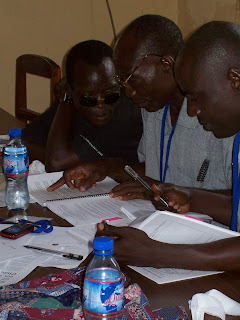 On Day 4, it was the end of our first week of training. We discussed the possibility of peace without resorting to violence. We reviewed what we learned the past few days-reflecting on using international instruments to promote peace and equality.
On Day 4, it was the end of our first week of training. We discussed the possibility of peace without resorting to violence. We reviewed what we learned the past few days-reflecting on using international instruments to promote peace and equality. With this in mind, the group brainstormed ways to work together-the Human Rights Monitor and the Hope for the Deaf school-to advocate for disability rights. Together, they decided to become more vocal and unified, urging the Liberian government and local organizations to provide services for
people with disabilities. They planned on utilizing local radio and newspaper outlets to generate awareness, as well as writing to government officials to encourage change.
It was a positive ending to the first week. Over the weekend, the participants looked forward to the next week of trainings, focusing on teaching peace through games and hands on activities.
_______________________________________________________
While in Liberia, it can be easy to concentrate on the "ugliness" of a war torn country--piles of refuse, shells of buildings, lack of services to parts of the country. It can be easy to overlook the beauty that it has--beautiful forests with great trees like the cotton tree shown, amazing views of the ocean and quiet beaches, the thankfulness of Liberia's people, even for the smallest of things.
It is never my intention to focus only on the negative, even though it may seem to overwhelm me at times; there is so much positive, so much determination and good will that radiates from Liberia that it is not hard to find hope. It is part of why I went back and will hopefully return to in the future.

 On the third day of the workshop, we discussed in depth the causes of conflict. The participants were able to make the connection between unmet basic needs and conflict, as well as how one handles conflict, which can either be in a positive way or a negative way. Though conflict (a disagreement) may be inevitable in life, it is the way one deals with conflict that will produce a positive or negative consequence. The participants also learned about various conflict resolution techniques through role plays and discussion.
On the third day of the workshop, we discussed in depth the causes of conflict. The participants were able to make the connection between unmet basic needs and conflict, as well as how one handles conflict, which can either be in a positive way or a negative way. Though conflict (a disagreement) may be inevitable in life, it is the way one deals with conflict that will produce a positive or negative consequence. The participants also learned about various conflict resolution techniques through role plays and discussion.
